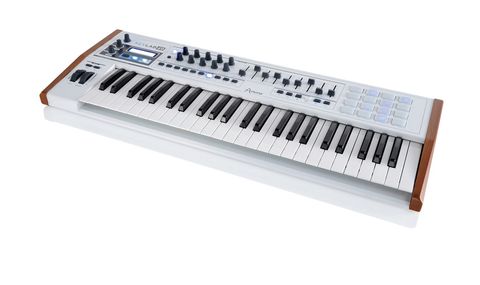Back in the summer, we had a chance to test MiniLab, a pint-sized keyboard controller from Arturia, designed to drive its Analog Lab software. This in turn offers over 5000 patches taken from Arturia's coveted V-Collection, which models Moogs, the Jupiter-8 and many other titles from the golden age of synthesis.
Arturia now returns with a new collection of keyboard controllers - the KeyLab series - which offer full-sized keys, more tactility, USB buss power, MIDI In and Out ports, and other features you'd expect from a 'professional' keyboard controller.
Indeed, while it is configured for instant control of Analog Lab, KeyLab uses CC messages, stretching its appeal beyond potential Analog Lab users.
Hardware tour
"Even at a glance, it's clear that the KeyLab 49 review model offers a different hardware experience to MiniLab"
Even at a glance, it's clear that the KeyLab 49 review model offers a different hardware experience to MiniLab. The full-size keyboard offers the first clue and while the action is a little light for this writer, it's perfectly playable.
Above this, a comprehensive collection of dials, sliders, pads and buttons make up the majority of the front panel. From left to right, these provide ten rotary dials, whose functions are easily 'doubled' via a convenient Bank 2 button, which toggles from the main set of mapped controls (Bank 1) to this second set, providing 20 controls in total.
To the right, nine freely assignable sliders are offered too and while these most readily function as envelope controls, you needn't be limited if you have other plans for these in mind. To the far right, a 4x4 matrix of rubberized pads provides 16 velocity sensitive triggers, which can either be used to generate specific MIDI keys (perfect for beat programming) or, via the Analog Lab software, to trigger a collection of assignable chords. You can select an individual chord (major, minor etc with a specific root note) for each pad, so if you prefer tapping out harmonic parts, rather than playing them from the keyboard, no problem.
To the left, an LCD screen keeps you up to date with settings, automatically displaying the most recently 'touched' hardware control, whilst hybrid rotary/selection buttons allow you to scroll through banks of sounds before selecting the one you want without having to reach for your mouse.
Plusses and minuses
In the bottom left-hand corner, Pitch Bend and Mod wheels are provided but, to have a moan here, they're too close together and they're too small. We could understand both decisions if the KeyLab 49 had been designed as a mini-keyboard but its 'full size feel' is undone slightly by this choice. Our only other concern is that the rotary knobs, in particular, are a little too easy to inadvertently remove. If you're a frantic twiddler, there's just a chance these will pop loose in your hands.
These two gripes aside, KeyLab delivers the 'pro' control option for the Analog Lab software it deserves. It's possible to drive the software much more intuitively from this keyboard, which will be helpful both to those whose work is primarily studio-based and for those who want to run Analog Lab live and want a control surface to match its capabilities. As KeyLab is also available in 25 and 61-key formats, these keyboards are serious considerations if you want a keyboard controller and find Analog Lab's great software irresistible.

